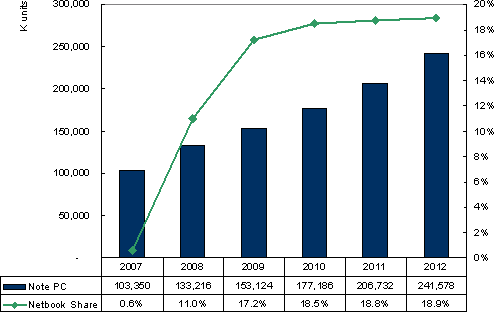This is the third in a series of articles about netbooks. First, we
learned what kind of
buyers like netbooks vs. smartphones, and then we saw how little impact netbooks
seem to have on web browsing habits. Today we are going to look at
the numbers and see why Apple can sit and wait.
The geniuses (who go by the name analysts) pieced together
two pieces of information to make a story. The first was netbooks,
which are cheap and small - are selling. The second piece was the
recession - people are buying less. By putting these two together, we
have the headline that people hit by the recession are going the have
to buy netbooks because they are cheaper than regular notebooks.
Therefore
everyone has to be selling netbooks, or they will be destroyed by the
recession.
The research firm
DisplayBank came out with a nice chart (below) to show the
"expected" rapid growth of netbooks. They made their chart to show how
the percentage of netbook sales goes above the bar graphs
showing the total number or notebook sales.

Notebook PC Shipments and Netbook Market Share Forecast (2007 to
2012)
This is very misleading. The bars show total unit sales, while the
netbook line shows percentage. If DisplayBank showed netbook sales in
units instead of percentages, the bars would be much smaller than the
ones for total notebook sales. (At least they use some common sense to
say that eventually the growth of netbooks will slow.)
Let's convert DisplayBank's projected percentages into potential
sales figures and see how they look:
Year Total Netbook Non-netbook
Year Notebooks Sales Sales
2007 103 million *4.3 million 99 million
2008 133 million 14.6 million 118 million
2009 153 million 26.3 million 127 million
2010 177 million 32.8 million 144 million
2011 207 million 38.9 million 168 million
2012 241 million 45.7 million 195 million
That is wonderful growth in this segment, but the notebook market is
still shown as growing 2009 - even when you subtract netbook sales.
This implies that growth of notebooks is not limited to new sales of
netbooks.
Why? Because notebook sales are eating into the sale of desktop
computers. This is true for both PCs and Macs. Notebook sales are going
to grow at a faster rate as desktop sales decline and people
switch.
What the chart shows is that netbooks are taking sales that
otherwise would have gone to higher priced notebooks. The total demand
for notebooks isn't shrinking; only part of the growth is converting to
the cheapest models.
Apple Doesn't Need to Do Cheap
Apple doesn't want to convert people to cheaper netbooks to sell
more units when they are already ignoring the budget range. Comparing
Macs to PCs, there is already a price difference. Apple has ignored the
current notebook market below the $999 price point. If the
average price of a PC notebook was $877 in 2008, then Apple has
been ignoring more than half of the notebook market. (The actual amount
is probably greater than 50% of the market, depending on how sales are
distributed.)
It hasn't hurt Apple's bottom line so far.
The other factor is that while netbooks sales will increase, the
volume will get distributed over the whole PC market, e.g., some to
ASUS, some to Acer, some to HP, some to Dell, some to Toshiba, etc. The
total amounts are going to be split up among dozens of vendors. Even if
Apple jumps into the game, it will only get a slice of the pie - not
the whole pie.
For Apple, sales of 4-5 million low margin notebooks (about 15% of
the market) is it not a prize worth fighting over.
If Apple can ignore 70-100 million notebooks selling in the $500
price range, there is no obvious reason that it can't continue to
ignore 14-32 million netbooks in the under $350 price range.
Why is Apple even bothering to watch what it going on?
Because the analysts could be right for the wrong reason. As
functionality of netbooks increases, there may come a time when regular
notebooks sales get cannibalized, much as the desktop market is today.
When/if this happens, don't be surprised to see Apple ready with a
brilliant new model that takes the market by storm.
But anything less than a huge slice of the pie is just not worth
chasing.
Based on these trends, I would give Apple 1-2 years of planning and
design time to work on a netbook worthy of the Apple name. There is no
reason for Apple to rush into this relatively small market.




